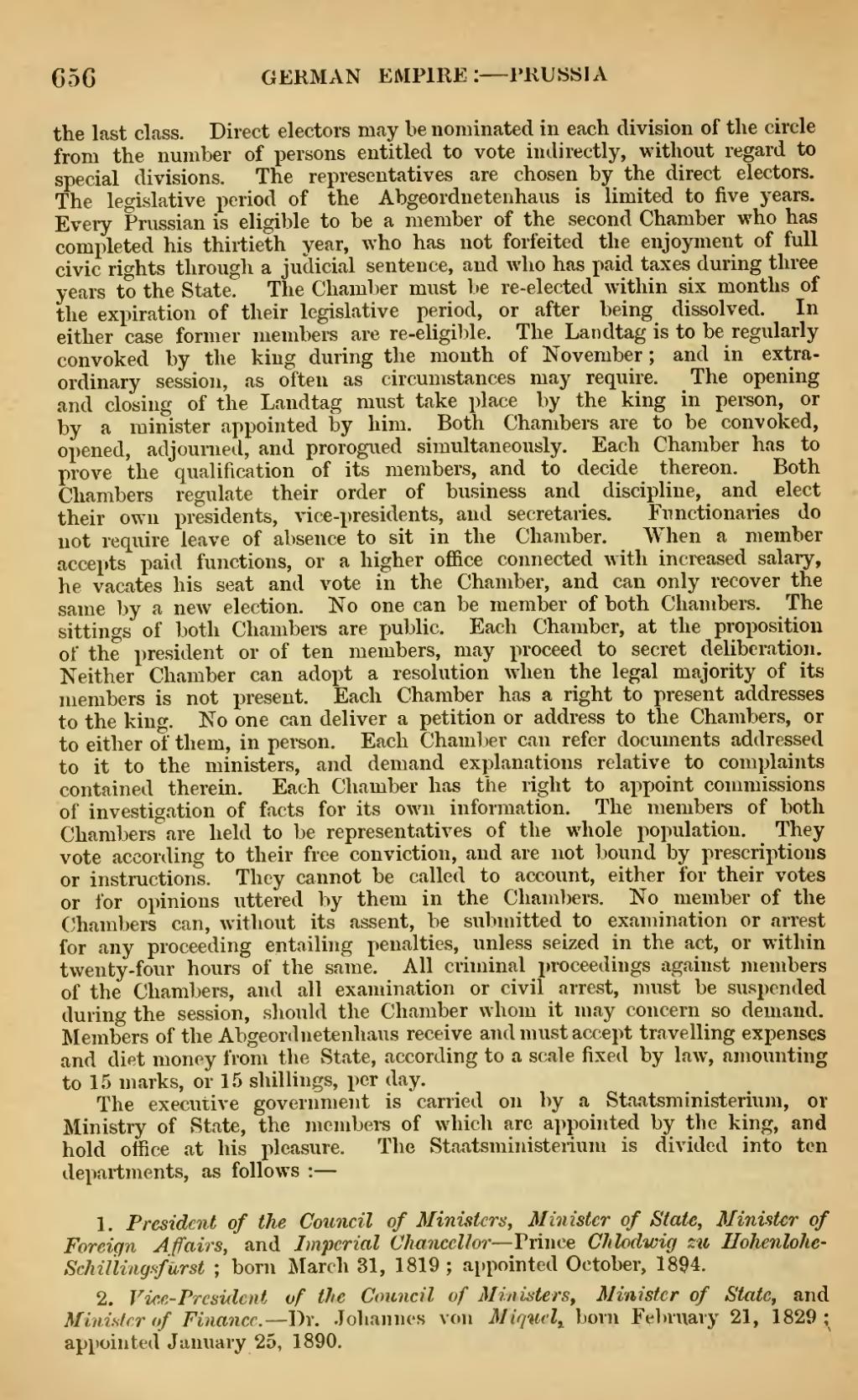656 GERMAN EMPIRE: — PRUSSIA
the last class. Direct electors may be nominated in each division of the circle from the number of persons entitled to vote indirectly, without regard to special divisions. The representatives are chosen by the direct electors. The legislative period of the Abgeordnetenhaus is limited to five years. Eveiy Prussian is eligible to be a member of the second Chamber who has completed his thirtieth year, who has not forfeited the enjoyment of full civic rights through a judicial sentence, and who has paid taxes during three years to the State. The Chamber must lie re-elected within six months of the expiration of their legislative period, or after being dissolved. In either case former members are re-eligilile. The Landtag is to be regularly convoked by the king during the month of November ; and in extra- ordinary session, as often as circumstances may require. The opening and closing of the Landtag must take place by the king in person, or by a minister appointed by him. Both Chambers are to be convoked, opened, adjourned, and prorogued simultaneously. Each Chamber has to prove the qualification of its members, and to decide thereon. Both Chambers regulate their order of business and discipline, and elect their own presidents, vice-presidents, and secretaries. Functionaries do not require leave of absence to sit in the Chamber. When a member accepts paid functions, or a higher office connected with increased salaiy, he vacates his seat and vote in the Chamber, and can only recover the same by a new election. No one can be member of both Chambers. The sittings of both Chambers are public. Each Chamber, at the proposition of the president or of ten members, may proceed to secret deliberation. Neither Chamber can adopt a resolution Avhen the legal majority of its members is not present. Each Chamber has a right to present addresses to the kino-. No one can deliver a petition or address to the Chambers, or to either of them, in person. Each Chamber can refer documents addressed to it to the ministers, and demand explanations relative to complaints contained therein. Each Chamber has the right to appoint commissions of investigation of facts for its own information. The members of both Chambers are held to be representatives of the whole population. They vote according to their free conviction, and are not bound by prescriptions or instructions. They cannot be called to account, either for their votes or for opinions uttered by them in the Chaml)ers. No member of the Chambers can, without its assent, be submitted to examination or arrest for any proceeding entailing penalties, unless seized in the act, or within twenty-four hours of the same. All criminal proceedings against members of the Chambers, and all examination or civil arrest, must be suspended during the session, should the Chamber whom it may concern so demand. Members of the Abgeordnetenhaus receive and must accept travelling expenses and diet money from the State, according to a scale fixed by law, amounting to 15 marks, or 15 shillings, per day.
The executive government is carried on by a Staatsministerium, or Ministry of State, the members of which are appointed by the king, and hold office at his pleasure. The Staatsministerium is divided into ten departments, as follows : —
1. President of the Council of Ministers, Minister of State, Minister of Foreign A fairs, and Imperial Chancellor — Prince Chlodwig su Uohenlohe- Schillingsfurst ; born March 31, 1819 ; appointed October, 1894.
2. Vice-President of the Council of Ministers, Minister of State, and Minister of Finance. — Dr. Johannes von Miguel, born February 21, 1829: appointed January 25, 1890.

